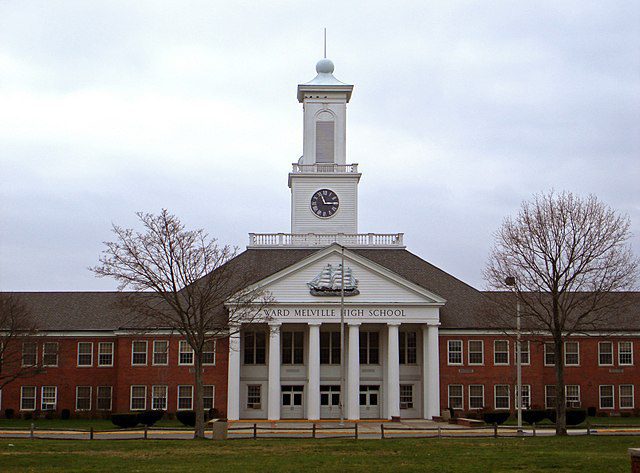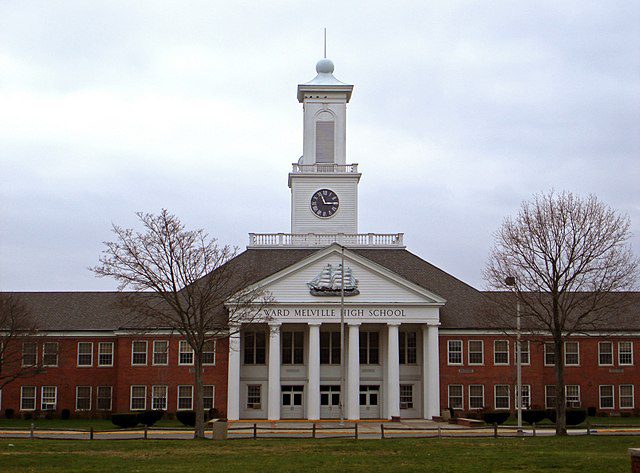Reconfiguring Three Village Central School District and changing start times could cost nearly $3 million, according to Superintendent of Schools Kevin Scanlon, who urged the Board of Education to decide by January whether to adopt the plan.
The superintendent advised that decisions are necessary soon to provide the district time to enact all the proposed changes by the target 2025-26 school year.
“We should try to do it all at once, as opposed to doing one piece here and then having another transition for families in another piece,” Scanlon said during a Dec. 13 presentation to the BOE.
The proposal entails moving sixth grade up to the junior high schools, bumping ninth grade up to the high school and making secondary school start times later. The plan aims to improve financial stability, realign the district in light of declining enrollment, bring the district into line with state norms and address health concerns surrounding early start times for adolescents.
Scanlon estimated costs to reconfigure buildings to accommodate the grade changes could be about $2 million for projects like converting faculty rooms back into classrooms and configuring spaces for science labs, art and music.
According to Scanlon, the start time change would require adding buses to the district’s rotation at a cost of $963,000 if implemented at the same time as the grade changes, and more if implemented in 2024-2025, before sixth and ninth move up.
Scanlon left on the table the possibility of repurposing an elementary school or the North Country administration building, though he warned the funds from such moves would not “solve all the world’s problems in this regard,” and any such discussions would need to wait for recommendations from this year’s recently convened Budget Advisory Committee.
A couple of the trustees, including Karen Roughley, wondered if it was possible to do more to improve district finances, especially since BACs in former years have already suggested the board consider repurposing a school.
“I’m not sure why we are pushing it off again when we’ve been talking about it for two years now,” she said, adding that the board could also discuss the possibility of repurposing both an elementary school and the North Country building, rather than either/or. “We need to look at this district’s financial stability going forward.”
During the public comment section, Gelinas Junior High School guidance counselor and district resident Anthony Dattero gave a grave warning against moving too fast on reconfiguration. “There’s something in the chemistry of the district that is unique and different,” he said, pointing to the many accomplishments for athletics and scholarship frequently honored at board meetings. “The benefits [of reconfiguring] have to be also looked at with what we’re trading off.”
He said he believes keeping sixth and ninth graders in the younger schools gives them a chance to mature and therefore be better prepared for their next stage of education.
Board president Susan Rosenzweig indicated the board will consider allowing public comment at the start of their Jan. 10 meeting to allow residents to express concerns before the board’s vote, rather than after the fact.
Residents can watch Scanlon’s presentation and the resulting discussion in its entirety on the district’s YouTube page under the “Live” tab, starting at 1:37:00.
Regents scores
Scanlon also sought to ease parental concerns over the board’s Nov. 29 vote to end the so-called Do No Harm policy, under which Regents scores were only factored into a course grade if they helped the grade [See story, “Split 4-2 vote keeps Regents scores in final grades for Three Village students,” Dec. 1, TBR News Media].
According to Scanlon, teachers can adjust grades up to 5 points on their own, or up to 10 points with administration approval. under a policy enacted in 2016.
“Before there was a Do No Harm policy, we had something in place,” he said, adding that Three Village teachers want to see students succeed. “One test shouldn’t define a child.”
Board member Vincent Vizzo chimed in to say he saw this policy in action when he was principal of Murphy Junior High School. “Plenty of teachers have come forward to ask me, ‘Vin, I really want to adjust a grade for a student,’” he said. “The teachers are aware.”







